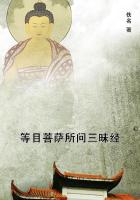The aimless jest that, striking, hath caused pain;
The idle word that he'd wish back again.
In no pages should I take it upon myself at this time to discourse of his books, of his refined knowledge of character, of his subtle acquaintance with the weaknesses of human nature, of his delightful playfulness as an essayist, of his quaint and touching ballads, of his mastery over the English language. Least of all, in these pages, enriched by his brilliant qualities from the first of the series, and beforehand accepted by the Public through the strength of his great name.
But, on the table before me, there lies all that he had written of his latest and last story. That it would be very sad to any one--
that it is inexpressibly so to a writer--in its evidences of matured designs never to be accomplished, of intentions begun to be executed and destined never to be completed, of careful preparation for long roads of thought that he was never to traverse, and for shining goals that he was never to reach, will be readily believed. The pain, however, that I have felt in perusing it, has not been deeper than the conviction that he was in the healthiest vigour of his powers when he wrought on this last labour. In respect of earnest feeling, far-seeing purpose, character, incident, and a certain loving picturesqueness blending the whole, I believe it to be much the best of all his works. That he fully meant it to be so, that he had become strongly attached to it, and that he bestowed great pains upon it, I trace in almost every page. It contains one picture which must have cost him extreme distress, and which is a masterpiece. There are two children in it, touched with a hand as loving and tender as ever a father caressed his little child with.
There is some young love as pure and innocent and pretty as the truth. And it is very remarkable that, by reason of the singular construction of the story, more than one main incident usually belonging to the end of such a fiction is anticipated in the beginning, and thus there is an approach to completeness in the fragment, as to the satisfaction of the reader's mind concerning the most interesting persons, which could hardly have been better attained if the writer's breaking-off had been foreseen.
The last line he wrote, and the last proof he corrected, are among these papers through which I have so sorrowfully made my way. The condition of the little pages of manuscript where Death stopped his hand, shows that he had carried them about, and often taken them out of his pocket here and there, for patient revision and interlineation. The last words he corrected in print were, "And my heart throbbed with an exquisite bliss". GOD grant that on that Christmas Eve when he laid his head back on his pillow and threw up his arms as he had been wont to do when very weary, some consciousness of duty done and Christian hope throughout life humbly cherished, may have caused his own heart so to throb, when he passed away to his Redeemer's rest!
He was found peacefully lying as above described, composed, undisturbed, and to all appearance asleep, on the twenty-fourth of December 1863. He was only in his fifty-third year; so young a man that the mother who blessed him in his first sleep blessed him in his last. Twenty years before, he had written, after being in a white squall:
And when, its force expended, The harmless storm was ended, And, as the sunrise splendid Came blushing o'er the sea;
I thought, as day was breaking, My little girls were waking, And smiling, and making A prayer at home for me.
Those little girls had grown to be women when the mournful day broke that saw their father lying dead. In those twenty years of companionship with him they had learned much from him; and one of them has a literary course before her, worthy of her famous name.
On the bright wintry day, the last but one of the old year, he was laid in his grave at Kensal Green, there to mingle the dust to which the mortal part of him had returned, with that of a third child, lost in her infancy years ago. The heads of a great concourse of his fellow-workers in the Arts were bowed around his tomb.















